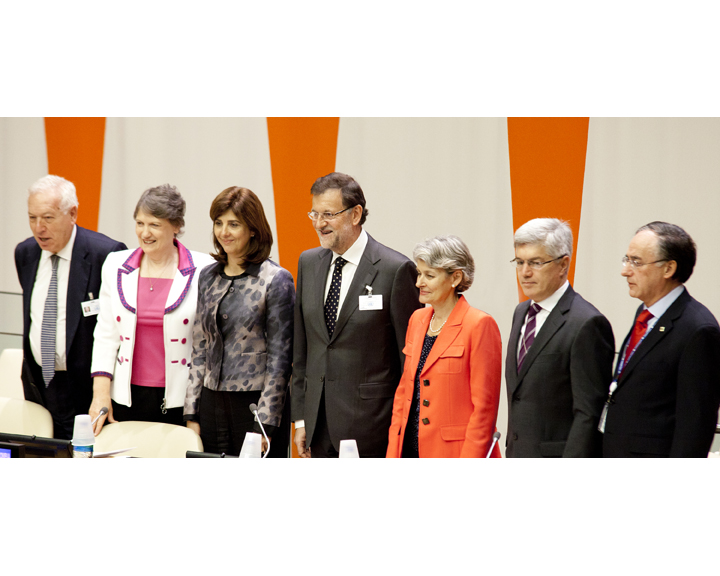

MDG-F improves life for 9 million people worldwide

Nearly 9 million people worldwide have directly benefited from the programmes of the Millennium Development Goals Achievement Fund (MDG-F), and these experiences can help inform global development efforts after 2015.
The results of the MDG-F’s work were presented yesterday at a UN ceremony attended by Spanish Prime Minister Mariano Rajoy, whose country’s US$900 million donation to the United Nations system created the MDG-F.
UNDP Administrator Helen Clark, UNESCO Director General Irina Bokova and Colombian Foreign Minister Maria Holguin Cuellar also participated, along with representatives from the 50 MDG-F programme countries, 20 United Nations entities and 87 civil society organizations.
“The experience of the MDG-Fund is extremely valuable for the definition of the post-2015 agenda,” Prime Minister Rajoy told the gathering, which coincided with a Special UN Event at which states renewed their commitment to achieving the MDGs and discussed the path for development efforts after the expiration of the current MDGs in 2015.
Pioneering joint and integrated development work
The MDG-F is a pioneer in the history of development. Its 130 programmes in 50 countries drew, for the first time, on the combined effort of the majority of UN agencies -- 27 in total -- and tackled complex development challenges by working across several connected sectors simultaneously.
“The MDG-F has been key in using an integrated response in the countries where we work,” said UNDP Administrator Helen Clark, who thanked Spain for its essential contribution to the UN system. “The knowledge derived from these programs is a very important contribution to the work of accelerating the progress of the Millennium Development Goals.”
UN Secretary-General Ban Ki-Moon, in written remarks, added: “The Fund has shown the importance of joint work and partnerships, and has proven an effective instrument for translating global policies and development instruments into real actions and concrete results for people.”
An example of the MDG-F’s intersectorial approach are its water and sanitation programmes, which have not only brought safe water to some 440,000 people, but have also improved health, nutrition, gender equality and the creation of an efficient agricultural sector in the project countries.
Other key MDG-F results include:
· 1.67 million children and 800,000 mothers have better nutrition.
· 630,000 women and girls can access violence prevention and protection services.
· 190,000 youth received job training, and 14.3 million young people and 1.8 million migrants are benefitting from new youth employment laws.
· 1.4 million citizens are participating in natural resource management initiatives.
· 400,000 youth are actively building peace and preventing conflicts.
Using culture as a development catalyst
An important area of work is the MDG-F’s culture and development programmes, which have served 2.3 million people with new and renovated cultural infrastructures that are increasing social inclusion and helping to reduce poverty.
“Culture is a key element for sustainable development and the achievement of the MDGs," said UNESCO Director General Irina Bokova. “Policies anchored in culture and development are more sustainable. The MDG Fund has shown the potential of culture to accelerate development."
President Rajoy of Spain, whose USD$900 million funding is the largest contribution by a single donor for MDG achievement in the UN’s history, said his country would maintain its commitment to international development.
"We have achieved a lot in the MDGs, but there is still a way to go,” Rajoy told the meeting. “We cannot afford distractions. Those who depend on us cannot afford them. What is at stake is the global welfare. We cannot consider development aid as an act of charity -- it is a joint investment in a common future."
Fighting poverty across the globe
The Millennium Development Goals Achievement Fund was created in 2007 through a landmark agreement between the Government of Spain and the United Nations, through the UNDP, to improve the lives of thousands of people around the world who live in extreme poverty. It is considered one of the major instruments of international cooperation for advancement towards the MDGs and the largest contribution by a single donor for this purpose in the history of the United Nations system .
The MDG-F has financed 130 joint programs in 50 countries through joint action with 27 UN agencies, local and national governments, NGOs, civil society organizations and individual citizens. It has worked to reduce child hunger and malnutrition, improve gender equality and youth employment, increase access to safe water, help communities protect their environment and adapt to climate change, develop the private sector, use culture to improve livelihoods and encourage conflict resolution and peacebuilding.
Click for the full text of UN Secretary-General Ban Ki-moon's remarks.
Click for the full text of UNDP Administrator Helen Clark's remarks.
Click to see our new interactive photo exhibit "Changing Lives."
Click to watch our video "The Impact of the MDG-F."